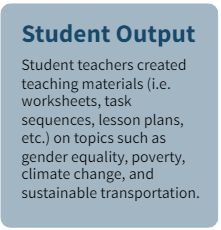Winner: Virtual Exchange for Global Education in Foreign Language Teaching
Course Summary:
Virtual exchange (VE), although not a direct replacement to physical mobility, can offer inclusive, cost-effective opportunities for authentic communication in a target language. This VE connects learners to enhance language, digital, and cultural competencies, fostering collaborative skills. Participants work with pre-service English as a Foreign Language (EFL) teachers from countries including Brazil, Chile, Israel, Sweden, and Turkey, discussing issues aligned with the UN's Sustainable Development Goals. They engage in icebreaker activities dealing with cultures and identities, compare and analyse teaching approaches and their perspectives on global issues, and develop complex competence tasks for implementation in EFL classrooms in secondary education.
Course Design:
English as a Lingua Franca
None of the participants are native speakers of English. Students immerse themselves in an extended period of using English as a shared lingua franca in an authentic context. Since young learners of English are more likely to use the language in lingua franca contexts than while communicating with native speakers, this allows the future teachers to assume the perspective of their future learners and develop strategies for communication with speakers of diverse backgrounds.
Safe Spaces
Meeting people with different lingua-cultural backgrounds – be it virtually or through physical mobility – does not automatically result in cultural competency in the sense of open-mindedness or respect for diversity. Therefore, it is important to provide opportunities for guided reflection by experienced mentors. In local classroom meetings and anonymous feedback spaces, students can report on their VE experiences. Teacher trainers and student assistants can act as mediators.
Brave Spaces
Students are required to develop teaching materials dealing with ‘glocal’ issues (relevant to all participants within a transnational teams). They are encouraged to engage in critical inquiry and controversial debates. Since extended exchange projects with heterogeneous participants are likely to lead to unforeseen developments and changes of plans, teacher trainers must be nimble. If students experience roadblocks or fruitful discussions on current issues (including political developments or conflicts in a participating region) arise, they are encouraged to find ways to continue these discussions in respectful manners. The original course workload may in such cases be reduced.
Contact:
Fabian Krengel (
